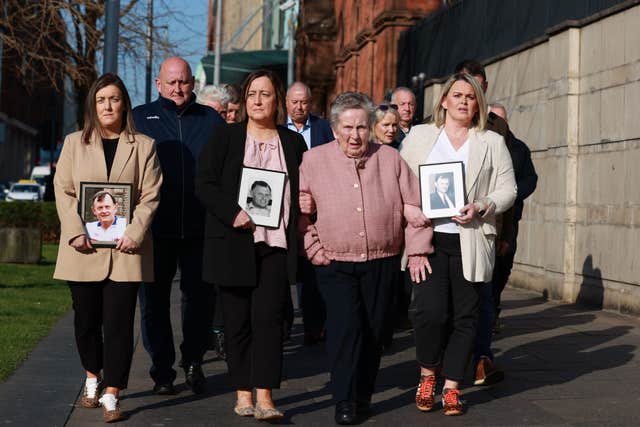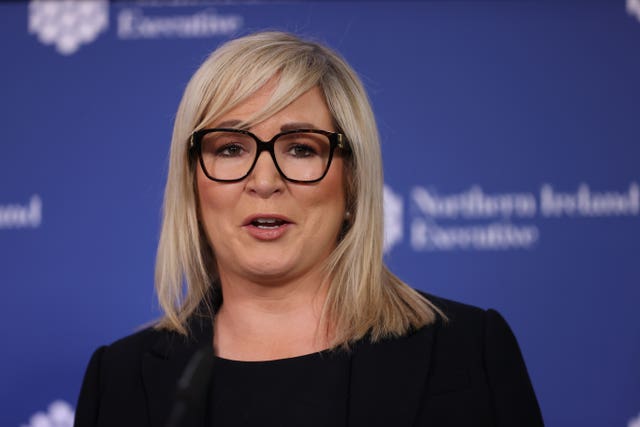Government failure to order public inquiry into Sean Brown murder ‘cannot stand’
The GAA official was murdered in 1997 by loyalists.

The Government’s failure to order a public inquiry into the murder of GAA official Sean Brown in 1997 was unlawful and “cannot stand”, the Court of Appeal in Belfast has ruled.
Northern Ireland’s Lady Chief Justice Dame Siobhan Keegan said she would not make a mandatory order at this point that NI Secretary Hilary Benn should establish a statutory inquiry, but has instead given him four weeks to “reflect upon the judgment of the court”.
The UK Government said it will “carefully consider” the court judgment, while Northern Ireland’s First Minister Michelle O’Neill urged it to “end its blockade” and allow the Brown family “access to truth and justice”.
Mr Brown, 61, the chairman of Bellaghy Wolfe Tones GAA club in Co Londonderry, was ambushed, kidnapped and murdered by loyalist paramilitaries as he locked the gates of the club in May 1997.
No-one has ever been convicted of his killing.
The Government had appealed against a decision by the High Court last year to order a public inquiry to be held into the murder.

Mr Brown’s widow Bridie Brown attended the hearing at the Royal Courts of Justice on Thursday.
Delivering the Court of Appeal judgment on Thursday, Dame Siobhan said there had been no human rights compliant investigation into the murder 28 years ago.
She said: “This is a shocking state of affairs in that a quarter of a century has passed since Sean Brown was murdered and yet there has been no lawful inquiry into the circumstances of his death.”
The Lady Chief Justice said: “We find the decision to refuse a public inquiry cannot stand and is unlawful and in breach of Article 2 obligations.”
She added: “An independent public investigation dealing with the coroner’s concerns, capable of dealing with sensitive material, with the Brown family legally represented, provided with the relevant material and able to examine the principal witnesses must be held without further delay in order to satisfy the obligations imposed by Article 2 of the European Convention on Human Rights, which all parties agree the UK Government is in breach of.”
She said she would adjourn the case for four weeks to give the Secretary of State time to consider the judgment of the court and to confirm how he would comply with the order.
She said: “We stress there can be no further delay in this case.”
Last year a coroner halted an inquest into the Brown killing, expressing concern that his ability to examine the case had been “compromised” by the extent of confidential state material being excluded from the proceedings on national security grounds.
Preliminary inquest proceedings had already heard that in excess of 25 people had been linked by intelligence to the murder, including several state agents.
It had also been alleged in court that surveillance of a suspect in the murder was temporarily stopped on the evening of the killing, only to resume again the following morning.
Coroner Mr Justice Kinney called on the Government to establish a public inquiry into the loyalist murder.
Mr Benn decided against holding an inquiry, arguing that the case could instead be dealt with by a new Troubles investigatory body, the Independent Commission for Reconciliation and Information Recovery (ICRIR).
Mr Brown’s widow Bridie challenged Mr Benn’s decision not to order a public inquiry and High Court judge Mr Justice Humphreys found in her favour in December and ordered the Government to establish one.
The Government then appealed against that decision.
Dame Siobhan told the court the limitations of the ICRIR to deal with cases like the Brown killing are “apparent”.
She said the commission, as it is currently established, is not equipped to deal with cases which involve sensitive material.

She said: “Mrs Brown is 87-years-old. She has been pursuing her remedy for 28 of those years.
“In this case, the ICRIR is not fit for the purpose of delivering the remedy she needs now.”
Dame Siobhan said the court recognised that in the past some inquiries have been costly.
But she added that the coroner had already undertaken the bulk of the work and reviewed sensitive material in the case.
She said there was nothing in theory to stop Mr Justice Kinney from being appointed to chair a public inquiry in the case.
“Such a bespoke inquiry, already fully armed by statute, with the powers to address sensitive material and building on the work of Mr Justice Kinney would be capable of delivering a remedy for Mrs Brown within a timescale that is relevant to her.”
Dame Siobhan said some of the advice given to the NI Secretary by civil servants around the cost of a public inquiry was “flawed”.
A further hearing in the case will take place on May 2.

A UK Government spokesperson said: “We have enormous sympathy for Mrs Brown and her family who have suffered so much.
“The Secretary of State has been clear that he wants to see a full investigation into the murder of Sean Brown.
“We acknowledge today’s judgment and will carefully consider it.
“This will not delay the Government’s determination to repeal and replace the Legacy Act, and to implement mechanisms that are human rights compliant and can command confidence across communities.”
Ms O’Neill said: “I want to again commend Bridie and the family for their courage and their tenacity, for their steadfastness in terms of getting access to truth and justice.
“But the British Government need to now get on with the public inquiry, end its blockade and allow access to truth and justice.”





